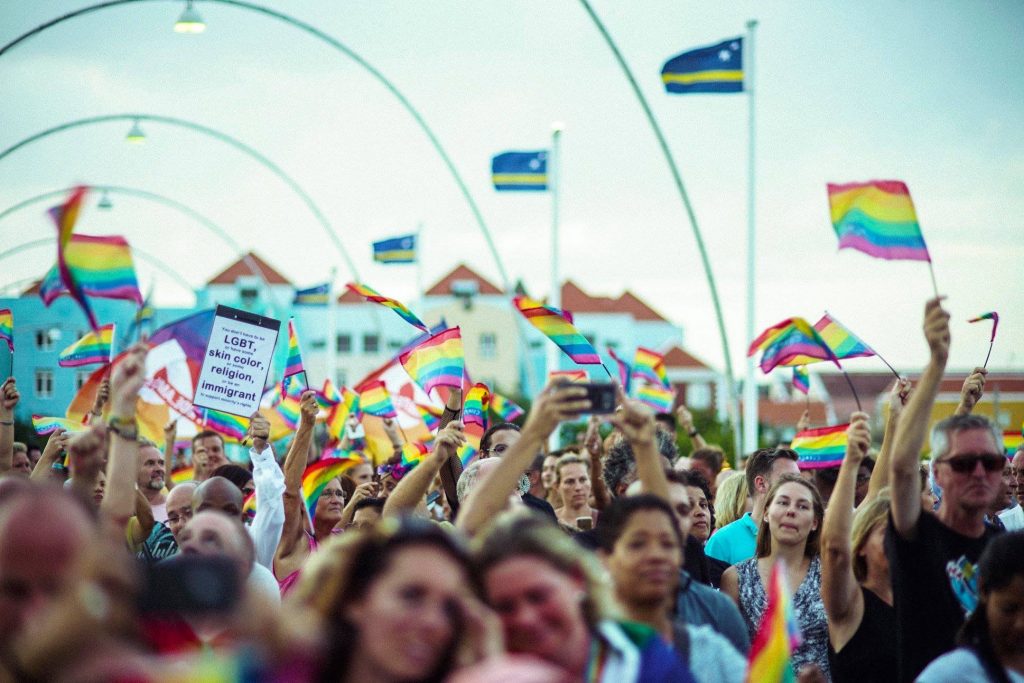Curacao violates constitution by excluding same-sex couples from marriage, court rules

WILLEMSTAD — By maintaining that marriage is only possible between a man and a woman is unlawful and in doing so, the government of Curacao violates article 3 of the constitution (the equality-principle), the Court in First Instance ruled on Monday.
Two women who live in Willemstad and who want to solidify their 10-year long relationship with marriage initiated the lawsuit against the country, supported by the Curacao-based Human Rights Caribbean Foundation.
Article 1:30 of the civil code states that marriage can only exist between a man and a woman. This is at odds with article 3 of the constitution: “Everyone who is in Curacao will be treated equally in equal circumstances. Discrimination based on religion, philosophy of life, political affiliation, race, gender or whichever other ground, is not permitted.”
The plaintiffs argued that the article in the civil code violates the constitution, the European Human Rights Treaty and, in particular, the equality-principle and the prohibition of discrimination.
“It is unfair that the law excludes couples of the same sex from marriage and that it not even provides a registered partnership or a similar system,” the plaintiffs stated.
But the country disagreed: it argued that it is not making an unauthorized distinction. “The plaintiffs cannot claim a marriage and the country is not obliged to introduce a registered partnership. People of the same sex with a lasting relationship are able to regulate the legal and financial consequences of that relationship sufficiently with existing instruments such as a domestic partnership contract and a will.”
The plaintiffs referred to scientific articles that say that homosexuality is biologically determined. The country contests these findings saying that science has not arrived at a definitive conclusion and that it cannot be excluded that homosexuality is a choice. The court considered the country’s argument, given the scientific substantiations, “too non-committal and insufficiently substantiated.”
“The court accepts that homosexuality is a matter of biology, not a choice.”
The plaintiffs furthermore claimed that ten percent of the population in Curacao, around 16,000 people, is homosexual. The court dismissed the numbers as irrelevant to the case: “Affectionate relationships and cohabitation of partners of the same gender are part of the social reality.”
The country argued that a majority of the population considers same-sex marriages at odds with its religious beliefs, but the court found no documented evidence for this argument.
On the contrary, a 2015 report from the Central Bureau of Statistics, established the exact opposite. Asked whether they would object to having a homosexual couple as their neighbors, 75 percent of those questioned answered with no. Seventy percent said that homosexuals should be treated the same as heterosexuals.
The court ruling notes that there are indications for increased acceptance of homosexuality. It refers to the (shelved) initiative-law of MPs Walroud and Williams in 2018 that aimed to make same-sex marriages possible and to the fact that in the March-2021 elections five political parties supported same-sex marriages and that three other parties supported registered partnerships. These parties won more than half of all votes cast. “The positions of these parties about legalizing homosexual relationships did not stop more than half of all voters to vote for these parties,” the ruling observes.
Aruba has included the option of registered partnerships in its civil code. It went into effect per September 1. The Netherlands did the same in 1998 and followed it up with legalizing same-sex marriages in 2001. Since 2010, when the islands became Dutch public entities, same-sex marriages are legal in Saba, Statia and Bonaire. And based on article 40 of the Kingdom Chapter, Curacao and other countries within the kingdom have to recognize same-sex marriages. “This has not resulted in social unrest,” the court ruling observes.
The ruling notes that confirming an affectionate relationship through marriage has “emotional, symbolical and immaterial value.” But excluding same-sex couples from marriage has also legal and financial consequences, for instance in the fields of taxes, pensions and inheritances.
The European Human Rights Court ruled already in 2016 that “contractual patchwork” like domestic partnership contracts and wills are not equal to a legal system like marriage or registered partnership.
“The current exclusion of same-sex couples from marriage without an alternative in the form of a registered partnership violates the equality principle and the prohibition of discrimination of article 3 of the constitution and is therefore unacceptable,” the court ruling states.
The court dismissed the country’s argument that it still has to research the population’s opinion about same-sex marriage. “In a constitutional state the applicability of classic basic rights for a minority cannot be made dependent on the opinion of the majority. After all, this is about basic rights,” the ruling states.
The court declared that Curacao acts unlawful towards the plaintiffs by excluding them from marriage, but that’s as far as it is prepared or able to go: “It is up to the legislator to put a stop to the unlawful discrimination of couples of the same sex in our civil code.”
The Human Rights Caribbean Foundation labeled the court ruling in a press statement as “a victory for equality.” The foundation says that the ruling comes as a surprise, because the Court in First Instance in Aruba ruled in 2020 that the question whether marriage should be open to couples of the same sex can be answered by each country individually, taking into account the social and cultural views in those communities.
“That ruling can now be considered as obsolete. The ruling of the Court in First Instance in Curacao is a step forward in the further emancipation of LBGT’ers and an asset for everyone who warmly supports basic rights and equality,” the foundation states.
In St. Maarten, MP Melissa Gumbs (Party for Progress) says that she is familiar with the court ruling. “Locally I have not heard of anyone who will file a similar injunction. To my knowledge there are not many married same sex couples on the island.”






















